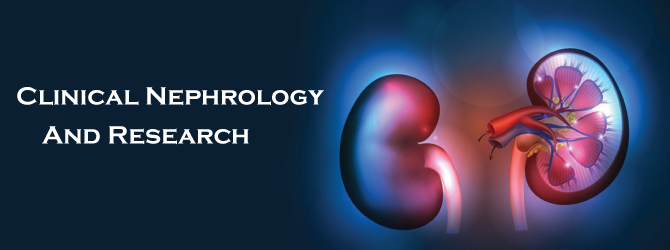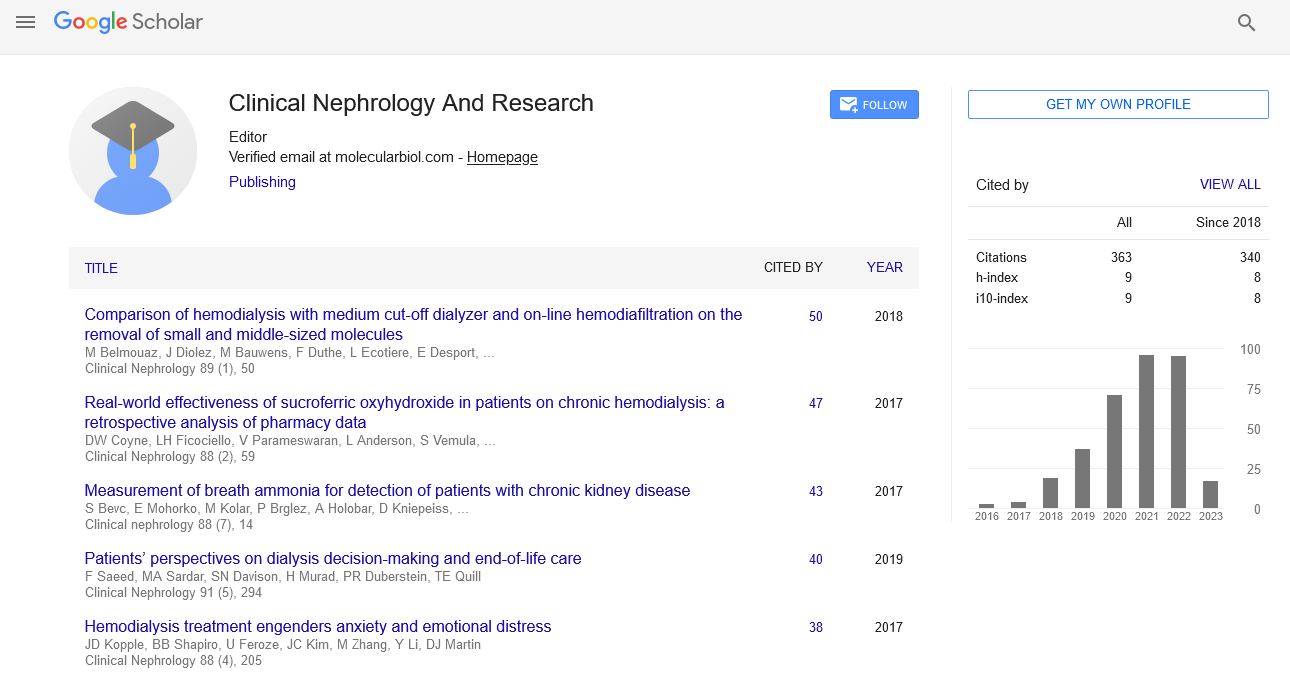An Indian study from a single center found that recipients of kidney transplants were infected with COVID-19
Received: 01-Jan-2024, Manuscript No. PULCNR-24-6010; Editor assigned: 02-Jan-2024, Pre QC No. PULCNR-24-6010 (PQ); Reviewed: 16-Jan-2024 QC No. PULCNR-24-6010; Revised: 22-Mar-2024, Manuscript No. PULCNR-24-6010 (R); Published: 30-Mar-2024
Citation: Yadav V. An Indian study from a single center found that recipients of kidney transplants were infected with COVID-19. Clin Nephrol Res 2023;7(1):1-2.
This open-access article is distributed under the terms of the Creative Commons Attribution Non-Commercial License (CC BY-NC) (http://creativecommons.org/licenses/by-nc/4.0/), which permits reuse, distribution and reproduction of the article, provided that the original work is properly cited and the reuse is restricted to noncommercial purposes. For commercial reuse, contact reprints@pulsus.com
Abstract
Worldwide, the 2019 Coronavirus Disease (COVID-19) has significantly increased morbidity and mortality. Pre-immunosuppression and other co morbidities can have an impact on COVID-19 results in transplant patients. The Kidney Transplant Recipients (KTRs) in this single center prospective cohort study were those who underwent a kidney transplant between kidney transplant between December 2012 and November 2020, were monitored at our facility, and obtained a diagnosis of COVID-19 disease between April 1 and November 30, 2020. Patients who have received a kidney transplant are significantly more likely to get COVID-19 due to their immunosuppression. Initial signs and symptoms are similar in COVID-19 positive KTRs and the general population. KTRs have a higher mortality rate than the overall population.
Keywords
COVID-19; Immunocompromised; Immunosuppression; Kidney transplant recipient; Morbidity; Mortality
Introduction
Before the end of 2019, researchers in Wuhan, Hubei Province, China, identified the novel Coronavirus (severe acute respiratory syndrome Coronavirus-2) as the cause of the Coronavirus disease 2019 [1]. The World Health Organization declared COVID-19 a pandemic in March 2020 because more cases were found globally by January 2020 despite international efforts to contain it. The first incidence of COVID-19 in India, which originated in China, was reported on January 30, 2020 [2,3]. The first COVID-19 mortality in India occurred on March 12 and involved a 76 years old man with a history of travel to Saudi Arabia [4]. Since then, the number of sufferers has increased nationwide at an exponential rate.
As the COVID-19 pandemic spreads, there is increasing evidence of severe morbidity, as seen by higher rates of hospitalisation in Intensive Care Units (ICUs) and death rates [5]. Solid organ transplant patients, including Kidney Transplant Recipients (KTRs), are at a very high risk of major COVID-19 effects due to the use of Immunosuppressive (IS) drugs and pre existing co morbidities such diabetes, hypertension, and cardiovascular illnesses [6].
Literature Review
All patients who received a kidney transplant at our hospital between December 2012 and November 2020 and were identified as having COVID-19 disease between April 1 and November 30, 2020, are included in this prospective cohort study [7]. Examining the prevalence, demographics, co morbidities, clinical and functional traits, and survival rates of COVID-19 disease in a population of kidney transplant recipients was the aim of this study. COVID-19 positivity was defined as a positive outcome on a real time Polymerase Chain Reaction (PCR) test of nasal and/or pharyngeal swab specimens [8].
After an initial negative quantitative RT-PCR, a second nasopharyngeal swab was taken if the patient presented a clinical presentation or radiologic imaging that was compatible with COVID-19 infection [9]. Depending on the severity of the patients' initial look, they were either hospitalised or released home. All charts were manually reviewed for demographic information, recent exposure history, immunosuppression changes, clinical signs and symptoms, and laboratory results [10]. According to WHO recommendations, patients were categorised as mild, moderate, severe, or critical, and their initial characteristics were compared. The study comprised all live and deceased donor KTRs. At least 18 years of age is required. Patients hospitalised to the hospital with COVID-19 sickness who were being monitored under the KTR programme at the time and many more.
Our institution's ongoing prospective study aims to learn more about COVID-19 disease in immunosuppressed post renal transplant patients. Our results show that obesity, diabetes, and hypertension are all independently associated with COVID-19 disease in kidney transplant recipients. Similar findings have been reached in other global studies [11]. The general public's COVID-19 infection has likewise been connected to these risk factors [12]. In our analysis, which was comparable to other studies, there was no association between COVID-19 disease and any specific age group, gender, ABO blood group, or smoking. In other studies, including the general population, it was discovered that COVID-19 disease was more common in a number of blood types. Because living donor transplantation is more common in our area and country than dead donor transplantation, patients with COVID-19 are more likely to get organs from living donors (95.1%). Although indicated that KTRs from deceased donors were more frequent, examinations at Columbia (80%), Paris (97%) and New York (77%) who were infected with COVID-19 found that 50% of donors were living, and 40% were deceased.
Remdesivir was widely used in our study due to the favourable outcomes reported in the general community. It was used in 64.5% of cases, the bulk of which were moderate to severe in nature. Its use increased as the epidemic did. Other studies indicated that it was used just 3% of the time, which is a lower usage rate. According to them, it was given in 8% of cases [13]. In our study, 3.2% of individuals received tocilizumab. Compared to reports that it was given in 20% of cases, 30% of cases, and 5% of cases, it was stated that it was given in 20% of cases.
Discussion
62 kidney transplant recipients were found to be positive with COVID-19. Their median age was between 19 and 61. The majority of those afflicted (87.1%) were men. Fever was the most frequent symptom (77.42%). A mild version of the illness affected, a moderate form affected 32, and a severe form affected 17. Based on the initial symptom, (24.1%) patients were treated in a critical care unit, 29 (46.7%) patients received treatment in an isolation ward and 18 (29.03%) patients received home therapy. Antimetabolites were utilised as the first line of therapy in the majority of patients, whereas calcineurin inhibitors were used in 22.5% of cases. In 64.5% of cases, remdesivir was prescribed, whereas anticoagulant drugs were in 54.84% of cases.
Conclusion
Organ transplant recipients are more prone to develop COVID-19 than the general population. We suggest that KTRs infected with COVID-19 should be regularly monitored because to the decreased immunosuppression. The symptoms are the same as those that non-transplant recipients endure. Based on parameters such as age, risk factors, infection severity, IS regimen, immunological status, and side effects, each case must be carefully evaluated and managed.
References
- Wu Z, McGoogan JM. “Characteristics of and important lessons from the Corona virus disease 2019 (COVID-19) outbreak in China: Summary of a report of 72314 cases from the Chinese center for disease control and prevention.” JAMA. 2020;323(13):1239-42.
[Crossref] [Google Scholar] [PubMed]
- Mahase E. “COVID-19: UK death toll overtakes Italy's to become worst in Europe”. BMJ. 2020;369:1850.
[Crossref] [Google Scholar] [PubMed]
- Elias M, Pievani D, Randoux C, et al. “COVID-19 infection in kidney transplant recipients: Disease incidence and clinical outcomes.” J Am Soc Nephrol. 2020;31(10):2413-23.
[Crossref] [Google Scholar] [PubMed]
- Richardson S, Hirsch JS, Narasimhan M. “Presenting characteristics, comorbidities, and outcomes among 5700 patients hospitalized with COVID-19 in the New York city area.” JAMA. 2020;323(20):2052-59.
- Sullivan JM, Ward S, Fogarty H, et al. “More on 'association between ABO blood groups and risk of SARS-CoV-2 pneumonia.” Br J Haematol. 2020;190(1):27-8.
[Crossref] [Google Scholar] [PubMed]
- Azzi Y, Parides M, Alani O, et al. “COVID-19 infection in kidney transplant recipients at the epicenter of pandemics.” Kidney Int. 2020;98(6):1559-67.
[Crossref] [Google Scholar] [PubMed]
- Nair V, Delsante M, Fiaccadori E, et al. “COVID-19 in kidney transplant recipients.” Am J Transplant. 2020;20(7):1819-25.
[Crossref] [Google Scholar] [PubMed]
- Pereira MR, Mohan S, Cohen DJ, et al. “COVID-19 in solid organ transplant recipients: Initial report from the US epicenter.” Am J Transplant. 2020;20(7):1800-8.
[Crossref] [Google Scholar] [PubMed]
- Banerjee D, Popoola J, Shah S, et al. “COVID-19 infection in kidney transplant recipients.” Kidney Int. 2020;97(6):1076-82.
[Crossref] [Google Scholar] [PubMed]
- Fernandez-Ruiz M, Andres A, Loinaz C, et al. “COVID-19 in solid organ transplant recipients: A single center case series from Spain.” Am J Transplant. 2020;20(7):1849-58.
[Crossref] [Google Scholar] [PubMed]
- Guillen E, Pineiro GJ, Revuelta I, et al. “Case report of COVID-19 in a kidney transplant recipient: Does immunosuppression alter the clinical presentation?” Am J Transplant. 2020;20(7):1875-78.
[Crossref] [Google Scholar] [PubMed]
- Zhu, L, Xu X, Ma K, et al. “Successful recovery of COVID-19 pneumonia in a renal transplant recipient with long-term immunosuppression.” Am J Transplant. 2020;20(7):1859-63.
[Crossref] [Google Scholar] [PubMed]
- Alberici F, Delbarba E, Manenti C, et al. “Management of patients on dialysis and with kidney transplant during SARS-CoV-2 (COVID-19) pandemic in Brescia, Italy.” Kidney Int Rep. 2020;5(5):580-85.
[Crossref] [Google Scholar] [PubMed]





